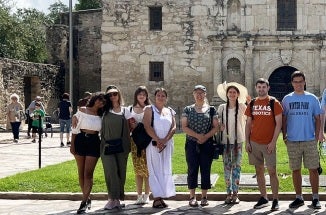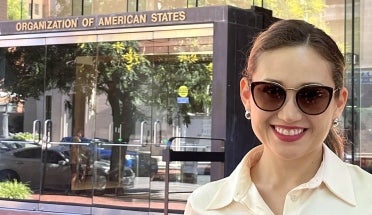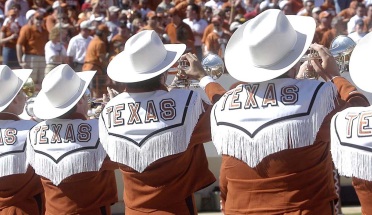
Center for Russian, East European and Eurasian Studies Leads Campus Response to War on Ukraine
- Nov 1, 2022
- International Student and Scholar Services
- by Alex Briseño
As the Russian Federation’s ongoing military invasion of Ukraine continues to send shock waves around the world, for many students, staff and faculty at The University of Texas at Austin, the lingering chord it strikes is a deeply personal one, too.
Mary Neuburger, Ph.D., director of the Center for Russian, East European, and Eurasian Studies (CREEES) and chair of Slavic and Eurasian Studies, fondly recalls a monthlong visit to Ukraine in 2019, where she formed special bonds with colleagues who quickly turned into friends.
“It’s hard,” Neuburger said. “We have Ukrainian scholars, a couple of Russian scholars who also fled the war, and we also have students, staff and faculty who all know people both in and from Ukraine and Russia. They know people who have literally walked or driven to various borders and are in some sort of limbo there.”
That’s why, shortly after the initial invasion, Neuburger shifted her focus toward organizing support.
“Nothing we can do will stop this tragedy or alleviate the suffering in Ukraine, but we hope we can make a difference,” she wrote in April in the College of Liberal Arts’ “Life & Letters” publication.
With that mission in mind, Neuburger got to work.
Early support for Neuburger’s efforts came from faculty, students and alumni who helped organize panels, contribute articles and TV spots about the war and, through the Global Disinformation Lab, form a crisis-response team to closely follow and analyze disinformation flows on the crisis, primarily emanating from Russia.
Established in 1984, CREEES now includes more than 80 faculty members from more than 20 different departments and administrative units across campus, offering educational and research opportunities focused on the languages, cultures, histories and politics of the Russian, East European and Eurasian regions.
Welcoming Displaced Scholars to Campus
By the end of April, with the support from Texas Global and numerous units across campus, CREEES secured eight paid, yearlong faculty positions for Ukrainian scholars displaced by the war.
Neuburger took the lead on relocation efforts with the help of CREEES staff member Michelle Daniel, who is also the executive producer of “The Slavic Connexion,” a UT podcast that shares research, news and culture from the Slavic world.
“I basically asked her, ‘Can you drop everything and help me work on this?’ ” Neuburger said.
After completing the relocation process—which included securing housing near campus, registering children at local schools, working through visa and immigration requirements with the help of Texas Global and nailing down transportation logistics—CREEES happily welcomed six Ukrainian scholars to campus throughout the summer ahead of the 2022-2023 academic year.
As new members of the Longhorn community, the scholars are now teaching, conducting research in labs across campus or working on individual research projects.
“I feel so blessed to have this time with the Ukrainian scholars,” said Neuburger. “They’re bringing so much to the table. I’m co-teaching a course with one of them (Dr. Volodymyr Kulikov) on conflict in eastern Europe, so we’ve been doing a lot of work on Russia-Ukraine.”
Roman Mykhailyshyn, a robotics engineer and professor from Ternopil, also made an immediate impact on the Texas Robotics lab upon his arrival.
“Just seeing the smile on his face, it’s been so awesome for him to work with our top-notch scholars at our amazing facilities at UT,” said Neuburger.
Victoria Trofimenko, an award-winning screenwriter and director from Kyiv, is an artist-in-residence at the Department of Slavic and Eurasian Studies. During her time in Austin, she hopes to finish the first draft of a book titled “Yakiv,” a companion to her recent film project of the same name about Yakiv Drobot, who saved nearly 3,000 lives during the 1931-1933 Holodomor, an artificial famine forced upon Soviet Ukraine by Joseph Stalin.
Whether the scholars, like Tetiana Klynina and Yuriy Loboda, are working in the Global Disinformation Lab to study Russian disinformation amid the war, or providing assistance with Ukrainian courses as a Fulbright Foreign Language Teaching Assistant like Lesia Cheban, Neuburger found a commonality among the scholars, regardless of their fields of expertise.
“I’ve realized that the most important thing about welcoming the scholars here is making sure they have a meaningful professional experience, too, which also becomes social, once [they] meet students and faculty working on the same projects. That’s what they miss,” said Neuburger. “They want to do something, and they are all doing really relevant work right now.”
Funding for Language Study, Research
CREEES secured $2 million from the U.S. Department of Education via two Title VI grants, which are offered to institutions that develop and maintain capacity and performance in regional or international studies and world languages. Neuburger explains that at least half the funds are allotted for direct student scholarships that are attached to foreign language studies.
“One thing that’s been cool is that [recently] we’ve had the highest enrollment in Ukrainian language classes that we’ve ever had, and some of them are getting full scholarships through the grant,” Neuburger said. “That has been great because one of the visiting Ukrainian scholars, Lesia Cheban, is a younger person on a Fulbright teaching assistantship that we hastily applied for once the war broke out.”
Neuburger added that the grant also helped them provide housing and supplemental stipends for Cheban, who is teaching Ukrainian alongside Dr. Oksana Lutsyshyna.
“Teaching Ukrainian language has been a big focus this year, and the grant helps us accomplish that,” said Neuburger. “Students are more motivated to study the language because of the availability of these fellowships. For graduate students, it’s a full ride—tuition paid, $20,000 [stipend] and insurance covered—and for undergraduate students, your tuition is paid and you get a stipend, so it’s a pretty good deal.”
Capturing ‘the Human Story’
For Neuburger, this shared experience with the scholars provides another layer of knowledge that she says she would not have gained otherwise. As a professor who teaches about the region and conflict, she explains that it’s difficult, but necessary, to tap into the human element of a story when teaching about historical and contemporary events such as this one.
“It’s really important in the humanities to do that,” Neuburger said. “We’re not just talking about numbers of people or policy in this cold way. We’re capturing the human story of what this means for actual people who are impacted by it.”
She added, “The [scholars who have come] here have so many people on the ground—friends, family, colleagues—and sharing this experience with them just makes it so personal and real.”
Learning from Complexities in Language
Neuburger also emphasizes the importance of processing the complexities of the war. And she now has the benefit of seeing firsthand the nuanced and complex entanglement of Russian and Ukrainian cultures, all the way down to the language.
Within the country, although many people from eastern Ukraine speak and understand Ukrainian, they consider Russian to be their first language, Neuburger explains.
“This is Putin’s whole justification for invading: He thinks they are Russians. But actually, what he was surprised to find out is that most of those people did not want to be a part of Russia because it isn’t a free country. It’s a country under authoritarian rule, and they were happy to be part of Ukraine,” Neuburger said.
She noticed that some conversations among scholars from eastern Ukraine are conducted solely in Russian. Other times, entire conversations will unfold in two languages with scholars from the west speaking in Ukrainian while their colleagues from the east reply in Russian.
“Seeing the texture of these relationships play out in person, I feel like I’ve learned even more about the complex dynamics of Ukrainian and Russian cultures that goes beyond politics,” Neuburger said.
Besides the scholars’ invaluable contributions in their respective fields, their presence alone is making an indelible impression, and in more ways than one. For students who lack a personal connection to Ukraine, Neuburger says, the scholars are connecting them to the heart of the war through personal stories and updates on the constant developments.
“One scholar’s husband is in Kyiv, and he’s been fighting in Ukraine,” Neuburger said. “I asked her, ‘Are you hoping your husband can come?’ and she said, ‘He can’t leave Ukraine. But once we win, he can come.’ I hope that happens.”
CREEES is continuing its efforts to welcome two additional scholars during the 2022-2023 academic year and is identifying additional forms of support it can offer as the war develops.



